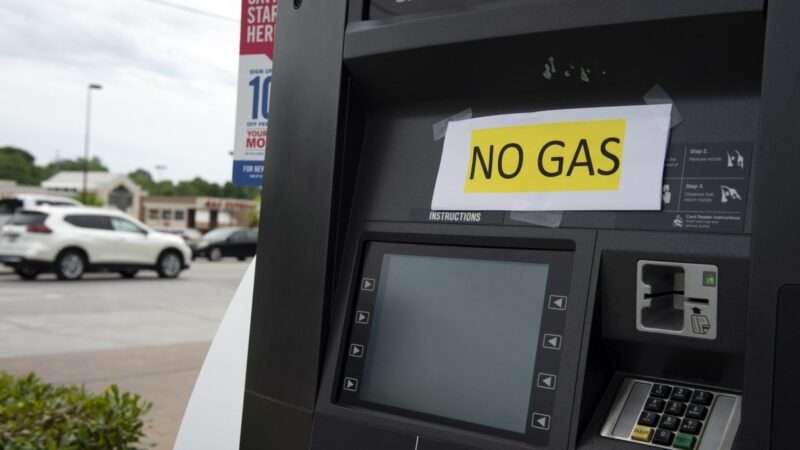
A cronyist, obsolete shipping law the federal government insists is supposed to protect America in times of crisis is being waived…because of a crisis.
That’s the absurdity of the Jones Act. Technically titled the Merchant Marine Act of 1920, the Jones Act requires that ships engaging in commerce between multiple U.S. ports be built in America, owned by an American company, and crewed by Americans.
The law drives up the cost of transporting goods around the United States using ships (particularly in places like Hawaii and Puerto Rico), and the protectionist consequences become very pronounced whenever fuel issues arise. The recent hacking and outage of the Colonial Pipeline resulted in fuel shortages in Southern states, and the restrictions dictated by the Jones Act have made it difficult to transport fuel from elsewhere.
On Wednesday, Department of Homeland Security Secretary Alejandro Mayorkas announced that in the name of “national defense,” he was authorizing a temporary waiver allowing a company to travel between ports along the Eastern Seaboard with ships that don’t comply with the Jones Act.
This announcement comes with an absurd disclaimer:
The Jones Act is vital to maintaining the strength of the American shipbuilding and maritime industries by requiring all maritime cargo transport between U.S. ports to occur on U.S. flagged vessels.
— Homeland Security (@DHSgov) May 13, 2021
How can anybody justify the Jones Act’s existence by saying it helps maintain “the strength of the American shipbuilding and maritime industries,” despite the fact that any major energy crisis requires it to be waived in order to meet very basic infrastructure needs?
The Jones Act has, in reality, profoundly limited America’s domestic transportation options and limited growth in sea commerce, all in the name of protecting a small number of entrenched maritime interests, both corporate and union, from international competition. And President Joe Biden has declared support for the Jones Act even with these predictable bad outcomes.
Colin Grabow, a trade policy analyst at the Cato Institute, noted Wednesday how the Jones Act thoroughly undermines smart energy policy in the United States. It’s cheaper for California to purchase gasoline from Singapore instead of transporting it from the Gulf Coast. Refined gas from the Gulf Coast is sent to Latin America instead of up north to East Coast ports. He adds:
At its worst, the Jones Act can even make domestic transportation outright impossible. While the United States is the world’s leading exporter of propane, Hawaii must buy it from as far away as Africa owing to a complete lack of Jones Act‐compliant ships capable of transporting it from the U.S. mainland. A similar absence of appropriate ships, meanwhile, means that Puerto Rico has no choice but to meet its bulk liquefied natural gas needs from foreign sources.
These inefficiencies are not just a hit to the country’s economic pocketbook, but a threat to its security. Reduced transportation options or over‐reliance on a single method of transport can lead to significant problems when things go awry, as we are painfully finding out. Redundancy and flexibility are key to overcoming systemic breakdowns, and the Jones Act means less of both.
It’s just complete nonsense whenever supporters of the Jones Act say it exists to protect national security. It’s not good for national security when our own federal laws limit domestic transportation of important infrastructure resources like fuel.
What is to be done? Well, the reason why Mayorkas had to claim a “national defense” need to justify the Jones Act waiver is because the law limits exemptions only for that purpose or by the Secretary of Defense for military operations.
Ideally, the Jones Act should just die already. But because there’s too much bipartisan political pressure to keep it by lawmakers from both parties in port cities, it seems unlikely. Grabow does propose an alternative, though:
Congress should create a new type of waiver allowing the use of non‐Jones Act ships if no vessel meeting the law’s requirements is available—no “national defense” justification required. Canada already has such a system. Other measures that should be on the table include a scrapping of the law’s U.S.-built requirement and permanent exemptions for parts of the United States that are uniquely dependent on maritime transportation such as Alaska, Guam, Hawaii, and Puerto Rico.
Until then, we’re going to see this every time there’s a fuel crisis, as we have when hurricanes hit the Gulf Coast or Puerto Rico. The Jones Act doesn’t help prevent emergencies. It makes them even worse.
from Latest – Reason.com https://ift.tt/3eLCowS
via IFTTT